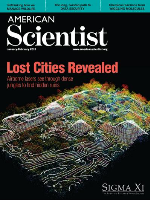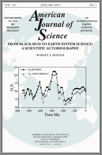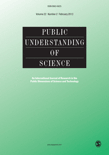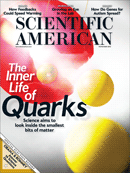
AMERICAN SCIENTIST
metrics 2024
Championing Quality Research for a Better Tomorrow.
Introduction
AMERICAN SCIENTIST is a prestigious multidisciplinary journal published by SIGMA XI-SCI RES SOC, renowned for its commitment to disseminating high-quality scientific research and insights since its inception in 1946. With an ISSN of 0003-0996 and an E-ISSN of 1545-2786, this journal serves as a valuable resource for researchers, professionals, and students alike, seeking to engage with current scientific discussions across various disciplines. Though it is not an Open Access journal, its articles are well-regarded in the academic community, evidenced by its Scopus ranking, placing it in the top 80th percentile among 88 multidisciplinary journals. Covering a wide range of topics, AMERICAN SCIENTIST aims to bridge the gap between science and the public by providing accessible writing that encourages informed dialogue around scientific advancement. With its extensive historical range from 1946 to 2016, it continues to be a critical platform for the exchange of innovative ideas and research findings that shape the future of science.
Metrics 2024
 -
- 0.50
0.50 0.60
0.60 -
-Metrics History
Rank 2024
Scopus
IF (Web Of Science)
JCI (Web Of Science)
Quartile History
Similar Journals

European Journal for Philosophy of Science
Illuminating the Intersection of Science and PhilosophyThe European Journal for Philosophy of Science, published by SPRINGER, stands as a prestigious platform for scholars in the realms of philosophy and history of science. With an impressive impact factor and categorized in the Q1 Quartile for both History and Philosophy of Science and Philosophy, this journal ranks among the top 10% of its peers, reinforcing its critical role in advancing academic discussions and insights within these fields. With its composition of rigorous peer-reviewed articles and a commitment to fostering interdisciplinary dialogue, the journal navigates foundational and contemporary issues that shape scientific inquiry. Although currently not Open Access, it provides invaluable access to researchers, professionals, and students who seek to deepen their understanding of the philosophical underpinnings of scientific practice. Housed in the Netherlands, the journal continuously engages with the evolving landscape of philosophy in the scientific domain, making it a key resource for anyone invested in the intersection of science and philosophy.

AMERICAN JOURNAL OF SCIENCE
Elevating Scientific Discourse in Earth and Planetary SciencesThe American Journal of Science, published by the esteemed Amer Journal Science, stands as a leading platform for groundbreaking research in the field of Earth and Planetary Sciences. With an impressive impact factor and distinguished Scopus rank 34/195 in its category, the journal occupies a prestigious position in the academic community, reflecting its high-quality and influential contributions to scientific knowledge. The journal’s objective is to disseminate original research, comprehensive reviews, and critical discussions that advance our understanding of geological processes and planetary phenomena, supporting scholars and practitioners in their pursuit of knowledge. Despite its traditional publication structure, viewers can explore its rich repository of works dating from 1945 to present, offering a wealth of insights into the dynamic Earth sciences. The journal remains a vital resource for researchers, professionals, and students eager to engage with the latest scientific findings and foster further innovation in the field.

Nuncius-Journal of the History of Science
Advancing Knowledge Through Historical InsightNuncius - Journal of the History of Science, published by BRILL, is a vital resource dedicated to the exploration and analysis of the intricate relationship between science and its historical context. Established with the goal of fostering scholarly discussion, this journal serves as a platform for researchers and historians to present their findings and interpretations regarding the evolution of scientific thought. With an impact factor reflective of its academic rigor and ranked in the Q3 category in the field of History and Philosophy of Science, it offers a rich archive of articles spanning converged years from 1986 to 2024. Nuncius encourages submissions that advance the understanding of science's impact on society, culture, and its philosophical underpinnings, making it a key reference for those engaged in the histories that define modern scientific inquiry. Situated in the scholarly landscape of the Netherlands, Nuncius remains an essential read for professionals, students, and academics seeking to deepen their knowledge in this significant field.

Momona Ethiopian Journal of Science
Elevating Local Research to Global StandardsMomona Ethiopian Journal of Science is a distinguished open-access journal that has been fostering scholarly communication in the realm of natural and computational sciences since its inception in 2009. Published by the Mekelle University, College of Natural and Computational Sciences, this journal provides a platform for researchers, professionals, and students to disseminate their findings, share innovative ideas, and engage with cutting-edge developments within the field. With its ISSN 2073-073X, the journal aims to enhance scientific discourse by welcoming high-quality manuscripts that address a variety of topics relevant to the Ethiopian and broader scientific communities. Although specific metrics like HIndex and Scopus rankings are currently unavailable, Momona’s commitment to open access ensures that its content is readily accessible, promoting a collaborative atmosphere conducive to research advancement. Located in Mekelle, Ethiopia, this journal not only contributes to local knowledge production but also aligns with global academic trends that emphasize accessibility and interdisciplinary collaboration.

PUBLIC UNDERSTANDING OF SCIENCE
Exploring the Dynamics of Public PerceptionPUBLIC UNDERSTANDING OF SCIENCE, published by SAGE PUBLICATIONS LTD, stands as a crucial multidisciplinary journal dedicated to exploring the intricate relationship between science and society. With its well-established history from 1992 through to 2024, this journal offers an essential platform for researchers, professionals, and students interested in the communication of scientific knowledge and its impact on public perception. Recognized for its high academic standards, it proudly holds a Q1 ranking in the categories of Arts and Humanities, Communication, and Developmental and Educational Psychology, signifying its significant influence and contribution to these fields. The journal’s impressive percentile rankings further underscore its vital role in advancing scholarship, interaction, and understanding in the public discourse of science. Although it does not currently offer open access options, the journal is committed to disseminating scholarly research that informs and enriches the dialogue on critical scientific issues, making it a pivotal resource for anyone engaged in or studying the dynamics of science communication.

Research
Driving engagement and excellence in multidisciplinary research.Research (ISSN: 2096-5168, E-ISSN: 2639-5274) is a premier open-access journal published by the American Association for the Advancement of Science, based in the United States. Since its transition to open access in 2018, the journal has established itself as a vital resource for the dissemination of high-quality, interdisciplinary research spanning various fields. With an impressive Q1 ranking in the multidisciplinary category for 2023 and a remarkable Scopus rank placing it in the top 6% of its field, Research is dedicated to advancing knowledge and fostering innovative research practices. The journal's comprehensive scope ensures that it caters to a diverse audience of researchers, professionals, and students, making it an essential platform for those looking to stay at the forefront of scientific discovery. The journal is actively accepting submissions for its converged years from 2018 to 2024, encouraging contributions that drive engagement and collaboration across disciplines.

SCIENCE PROGRESS
Unveiling breakthroughs that drive progress.SCIENCE PROGRESS, published by SAGE Publications Ltd, is a prestigious multidisciplinary journal with an impactful presence in the realm of scientific research. Recognized for its high quality, the journal holds a Q1 status in the 2023 category quartiles and ranks 35th out of 171 in its field, placing it in the 79th percentile within Scopus rankings. With its ISSN 0036-8504 and E-ISSN 2047-7163, SCIENCE PROGRESS has been a pivotal platform since its inception in 1946, fostering innovation and dissemination of knowledge across various scientific disciplines. Based in the United Kingdom, the journal aims to provide a comprehensive arena for researchers and professionals to share groundbreaking findings and insights, contributing to the advancement of scientific progress. Although the journal does not offer open access, it continues to be a vital resource for academics and practitioners alike, maintaining its relevance in a rapidly evolving scientific landscape.

Cultura Cientifica
To Illuminate the Path of Scientific Discovery.Cultura Cientifica is a distinguished open-access journal published by FUNDACION UNIV JUAN CASTELLANOS, dedicated to fostering scientific knowledge and community engagement within the field of science and technology. With an ISSN of 1657-463X and an E-ISSN of 2389-9638, the journal has been providing unrestricted access to research since its inception in 2001, effectively contributing to the dissemination of valuable scientific insights. Based in Tunja, Boyacá, Colombia, "Cultura Cientifica" aims to serve as a platform for researchers, professionals, and students by featuring high-quality research articles, reviews, and case studies that reflect the latest advancements and debates in the scientific community. Although the journal does not currently have an H-index or Scopus ranking, its commitment to open access and knowledge sharing makes it an essential resource for those seeking to expand their understanding and impact within the scientific discourse.

SCIENTIFIC AMERICAN
Illuminating Complex Ideas for a Broader AudienceSCIENTIFIC AMERICAN, published by Springer, stands as a prestigious multidisciplinary journal dedicated to disseminating cutting-edge scientific knowledge across a range of fields. Established in 1947, this journal has been integral in bridging the gap between scientific research and public understanding, making complex ideas accessible to a broader audience. With an ISSN of 0036-8733 and E-ISSN of 1946-7087, it maintains a strong standing within the academic community, currently ranked in the Q3 category for its multidisciplinarity, and is positioned at #93 out of 120 in its Scopus ranking, reflecting its valuable contribution to scientific discourse. While the journal is not open access, its long history and commitment to knowledge sharing ensure it remains a vital resource for researchers, professionals, and students alike, fostering a deeper appreciation of science in society.

National Science Review
Driving collaboration across disciplines for impactful solutions.National Science Review, published by Oxford University Press, stands as a premier open-access journal dedicated to advancing the frontiers of multidisciplinary scientific research. With an impressive impact factor reflective of its high citation rates and a Q1 ranking within its category as of 2023, it ranks #5 out of 171 journals in its field, placing it in the 97th percentile of Scopus' multidisciplinary rankings. Since its inception in 2014, the journal has evolved into a pivotal platform for the dissemination of innovative findings across various scientific disciplines, attracting contributions from leading researchers globally. Accessible to both academics and professionals alike since its transition to open access in 2020, the journal not only promotes collaboration but also ensures the broad dissemination of knowledge critical for tackling pressing global challenges. Residing in the historic city of Oxford, United Kingdom, it continually seeks to contribute to the global conversation on scientific advancements and their implications for society, making it an indispensable resource for anyone at the intersection of science and innovation.